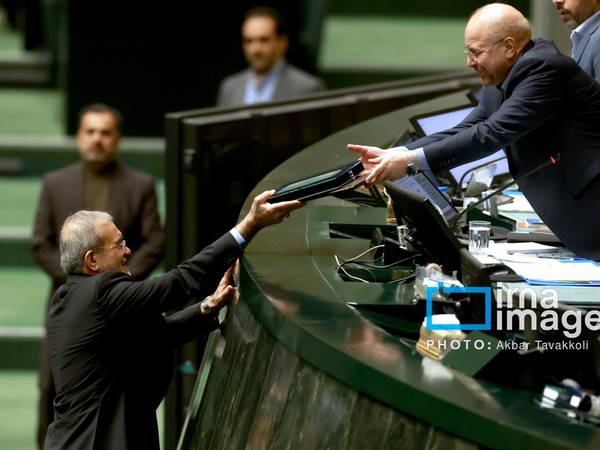Iranian President Masoud Pezeshkian presented his government’s first budget outline to parliament on Tuesday, signaling plans to tackle rising fuel subsidy costs ahead of the new fiscal year starting March 21.
Pezeshkian stated that the budget, developed over two months, focuses on boosting economic growth and reducing inequality. He emphasized that strengthening defense capabilities and controlling inflation are also key priorities in the proposal.
Addressing the lawmakers, he warned that the rising cost of subsidies for fuel, including gasoline, has become a critical issue, with current consumption levels 40% higher than in 2019.
He explained that the production cost of each liter of gasoline—excluding crude oil—stands at approximately 80,000 rials (about 13 US cents). Furthermore, imported gasoline costs between 300,000 and 400,000 rials per liter (50 to 65 US cents).
Iran's heavily subsidized gasoline costs just 2 cents per liter (or less than 10 cents per gallon), making it one of the cheapest in the world. However, this subsidy comes at a steep price for the government, which spends billions annually to sustain it. To manage consumption, Iran has implemented a rationing system: motorcycle owners are limited to 25 liters per month, while personal car drivers can access up to 60 liters. Any usage beyond these limits incurs a charge of 5 cents per liter. In comparison, average gasoline prices in the region hover around $1 per liter.
For most Iranians, who earn about $200 per month, a large increase could push an already struggling population to the brink. Violent protests shook Iran in November 2019, when the government suddenly tripled gasoline prices.
Pezeshkian also stressed that reforms in the energy sector and fuel subsidies are essential to managing the nation’s growing economic imbalances.
He warned that if current consumption trends continue, Iran will need to import 130 trillion tomans (over $2 billion) worth of gasoline next year. This, he stressed, requires urgent reform to address these imbalances and ensure that energy subsidies benefit the most vulnerable.
While Iranian officials frequently assert that gasoline consumption is rising, reports from Iran International reveal that a significant portion of the daily gasoline sold is actually smuggled to neighboring countries due to the stark price disparity.
Pezeshkian pointed out that the budget calls for gradual economic reforms, including changes to the multi-tiered currency exchange system and fuel subsidies. He cited agreement among economists on the need to move towards a unified exchange rate. The Central Bank is already working on this policy, aiming to streamline currency exchange and reduce vulnerabilities to corruption within the economy, he added.
The president admitted that this budget, like many before it, faces challenges, particularly the country’s reliance on oil exports and deficits. Due to US sanctions, the Iranian government refrains from disclosing exact figures on its oil revenue. To circumvent sanctions, a significant portion of the country's exports is sold to smaller buyers, such as "teapot" refineries in China, through third parties. The government’s lack of transparency on this issue complicates the process of assessing the true state of the budget and revenue forecasts.
While the budget bill is a general draft and lacks detailed numbers on oil and fuel prices, Pezeshkian expressed confidence that it will eventually be approved by the Parliament. Historically, the Iranian Parliament has passed budget bills despite known deficits, which the government prefers to call "imbalances" or "discrepancies." Pezeshkian acknowledged that the country faces significant budget shortfall in several sectors.
For example, Pezeshkian noted that the government struggled with budget deficits in paying wheat farmers, a situation that was only resolved with the Supreme Leader’s approval to borrow from the National Development Fund.
The president also emphasized that next year’s budget draft includes increased support for low-income families, tax exemptions for wage earners, and expanded resources for healthcare, rail development, and housing for the underprivileged. However, tax revenues in the new budget are projected to reach a ceiling of 17,000 trillion rials (over $28 billion), marking a 39% increase year-on-year.
Immediately after delivering his speech to parliament, Pezeshkian visited the Hamas office in Tehran to offer condolences for the death of Yahya Sinwar, the leader of the group.
